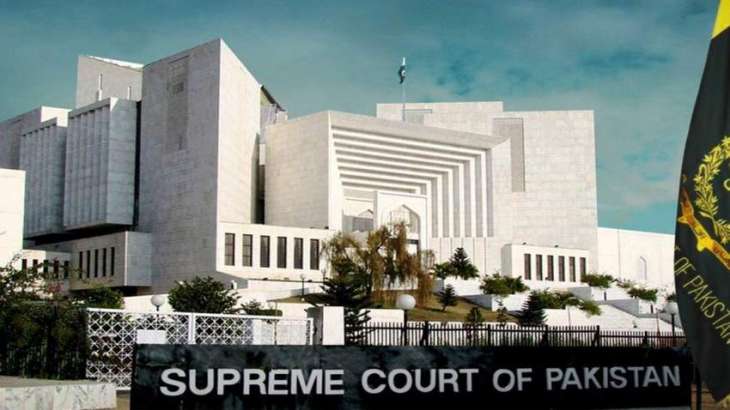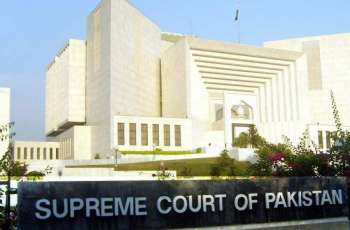A three-member bench headed by Chief Justice Umar Ata Bandial heard the case.
ISLAMABAD:(UrduPoint/Pakistan Point News-June 19th, 2023) The Apex Court has reserved its decision on Supreme Court Review of Judgments and Orders Act 2023.
A three-member bench headed by Chief Justice Umar Ata Bandial heard the case.
Ghulam Mohiuddin, Zaman Khan Vardak, and the Jurists Foundation, represented by CEO Riaz Hanif Rahi, raised objections to the legality of the Act.
During the hearing held today, Mansoor Usman Awan, the Attorney General for Pakistan (AGP), and Ali Zafar, the lawyer representing Pakistan Tehreek-e-Insaf (PTI), presented their arguments. Following their presentations, the Supreme Court reserved its verdict.
Chief Justice of Pakistan (CJP) Bandial observed that the verdict would be announced after thorough deliberation.
AGP Mansoor, while initiating his arguments, defended the right to appeal cases under Article 184-3, emphasizing that such cases fall under a separate jurisdiction for review.
In response, CJP Bandial noted that while the government has the authority to legislate, granting the right of appeal in revision cases may not be appropriate.
He remarked, "The right to appeal in Article 184/3 cases should be carefully considered. Even in India, there is no direct right of appeal in Article 184/3 cases."
The AGP maintained that the Constitution does not impose any limitations on the scope of revision jurisdiction.
CJP Bandial acknowledged that the legislature had the power to expand the review jurisdiction, but emphasized the importance of careful consideration before drafting legislation.
The attorney general informed the court that during the previous hearing, he had already mentioned the expanded jurisdiction of the court.
During the hearing, the AGP urged the court to dismiss the petitions challenging the Supreme Court Review Act.
When questioned about the procedure for challenging a law, the AGP submitted that the petitioners could have challenged the legislation in the High Court under Article 199.
He concluded his arguments by saying, “the current legislation will not impede the delivery of justice or the review decisions,”.
Meanwhile, CJP Bandial emphasized the need to identify any errors in order to review the decision of the main case.
He remarked, “Legislation is necessary, but it should not leave any room for ambiguity,”. He further expressed his reservations about granting the right of appeal in review cases.
Ali Zafar, the lawyer representing PTI, argued at the beginning of his statements that changes in the powers of the apex court cannot be made through legislation alone.
He asserted that a constitutional amendment is required to alter the powers of the Supreme Court, citing numerous previous court decisions related to judicial powers.
Zafar argued that Article 187 grants the Supreme Court wide-ranging authority to ensure complete justice.
The lawyer contended that a case cannot be reheard solely by forming a larger bench under the Constitution.
Subsequently, the CJP instructed all lawyers to submit their arguments in writing, including relevant references.
Regarding the Review of Judgments and Orders Act 2023, the petitioner, Rahi, urged the court to declare the Act unconstitutional, null and void from its inception, and issued without jurisdiction or legal effect.
Rahi's petition named the government, represented by the Secretary of the Ministry of Law and Justice and the Secretary of the Senate Secretariat, Muhammad Qasim Samad Khan, as respondents.
The petition argued that the law is unconstitutional, passed by the government for its own benefit in order to avoid the current CJP's regime, without considering the public interest, and exceeding their constitutional limits based on extraneous considerations and ulterior motives.
The law came into effect on May 5, 2023.
Referring to the Act, Law Minister Azam Nazeer Tarar mentioned Article 188 of the Constitution, stating that it empowers the Supreme Court, subject to the provisions of any Act of Majlis-e-Shoora and any rules established by the court, to review any judgment or order pronounced by it. He explained that the latest legislation is procedural in nature and aligns with the spirit of Article 188 of the Constitution. Law Minister Tarar clarified that the bill was formulated to enable the Supreme Court to review its own judgments and orders within the framework established by the legislature.
Efforts were made during the hearing to address the concerns raised by the petitioners and to understand the constitutional implications of the Review of Judgments and Orders Act 2023. The Attorney General and the PTI lawyer presented their arguments, highlighting the need for a careful examination of the right to appeal in revision cases and the extent of the Supreme Court's powers.
The Chief Justice of Pakistan acknowledged the importance of legislative actions but emphasized the need for clarity and precision to avoid any ambiguity in the legislation. He also recognized that while the court's review jurisdiction can be expanded, it should be approached with caution and based on concrete reasons.
After the arguments, the Supreme Court reserved its verdict on the matter.




